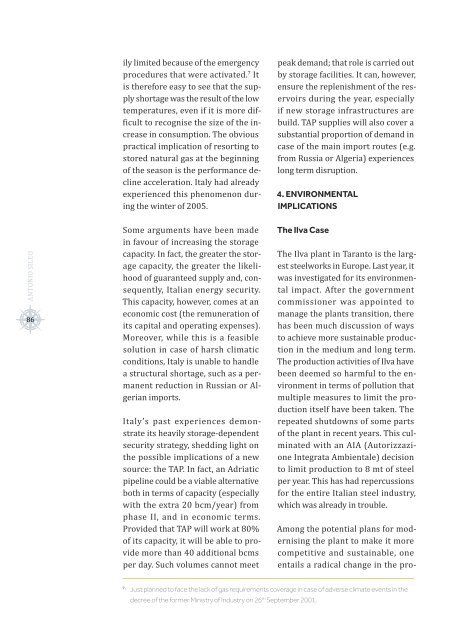Caspian Report - Issue: 07 - Spring 2014
You also want an ePaper? Increase the reach of your titles
YUMPU automatically turns print PDFs into web optimized ePapers that Google loves.
ily limited because of the emergency<br />
procedures that were activated. 7 It<br />
is therefore easy to see that the supply<br />
shortage was the result of the low<br />
temperatures, even if it is more difficult<br />
to recognise the size of the increase<br />
in consumption. The obvious<br />
practical implication of resorting to<br />
stored natural gas at the beginning<br />
of the season is the performance decline<br />
acceleration. Italy had already<br />
experienced this phenomenon during<br />
the winter of 2005.<br />
peak demand; that role is carried out<br />
by storage facilities. It can, however,<br />
ensure the replenishment of the reservoirs<br />
during the year, especially<br />
if new storage infrastructures are<br />
build. TAP supplies will also cover a<br />
substantial proportion of demand in<br />
case of the main import routes (e.g.<br />
from Russia or Algeria) experiences<br />
long term disruption.<br />
4. Environmental<br />
implications<br />
AntonIo SIleo<br />
86<br />
Some arguments have been made<br />
in favour of increasing the storage<br />
capacity. In fact, the greater the storage<br />
capacity, the greater the likelihood<br />
of guaranteed supply and, consequently,<br />
Italian energy security.<br />
This capacity, however, comes at an<br />
economic cost (the remuneration of<br />
its capital and operating expenses).<br />
Moreover, while this is a feasible<br />
solution in case of harsh climatic<br />
conditions, Italy is unable to handle<br />
a structural shortage, such as a permanent<br />
reduction in Russian or Algerian<br />
imports.<br />
Italy’s past experiences demonstrate<br />
its heavily storage-dependent<br />
security strategy, shedding light on<br />
the possible implications of a new<br />
source: the TAP. In fact, an Adriatic<br />
pipeline could be a viable alternative<br />
both in terms of capacity (especially<br />
with the extra 20 bcm/year) from<br />
phase II, and in economic terms.<br />
Provided that TAP will work at 80%<br />
of its capacity, it will be able to provide<br />
more than 40 additional bcms<br />
per day. Such volumes cannot meet<br />
The Ilva Case<br />
The Ilva plant in Taranto is the largest<br />
steelworks in Europe. Last year, it<br />
was investigated for its environmental<br />
impact. After the government<br />
commissioner was appointed to<br />
manage the plants transition, there<br />
has been much discussion of ways<br />
to achieve more sustainable production<br />
in the medium and long term.<br />
The production activities of Ilva have<br />
been deemed so harmful to the environment<br />
in terms of pollution that<br />
multiple measures to limit the production<br />
itself have been taken. The<br />
repeated shutdowns of some parts<br />
of the plant in recent years. This culminated<br />
with an AIA (Autorizzazione<br />
Integrata Ambientale) decision<br />
to limit production to 8 mt of steel<br />
per year. This has had repercussions<br />
for the entire Italian steel industry,<br />
which was already in trouble.<br />
Among the potential plans for modernising<br />
the plant to make it more<br />
competitive and sustainable, one<br />
entails a radical change in the pro-<br />
7.<br />
Just planned to face the lack of gas requirements coverage in case of adverse climate events in the<br />
decree of the former Ministry of Industry on 26 th September 2001.










